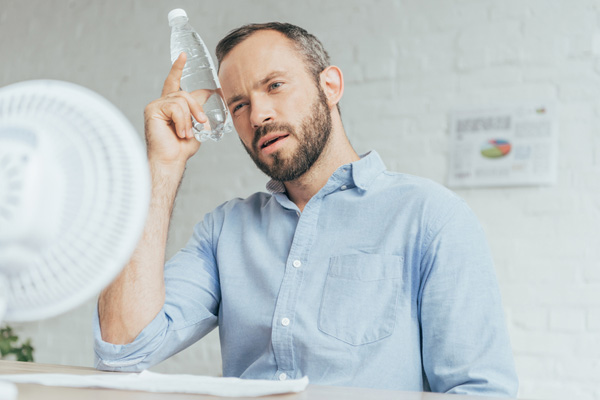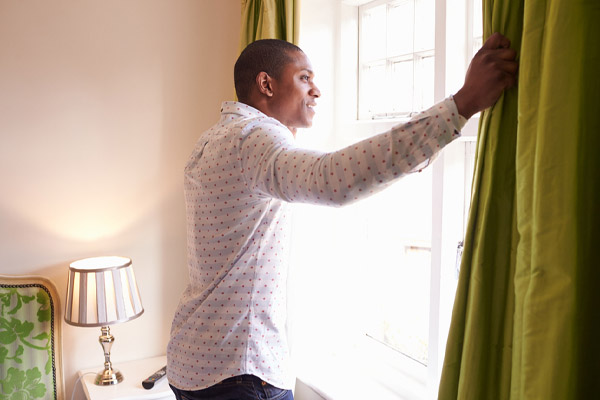The Centers for Disease Control and Prevention (CDC) state that some of the biggest health hazards that occur in the summer are sunburns, dehydration, and heatstroke. In fact, around 1,300 Americans die from heat-related problems annually, per the US Environmental Protection Agency (EPA). Therefore, it is crucial that people stay cool on the hot days of summer to prevent overheating, as this can cause heat exhaustion or heatstroke. Also, to avoid a problem with your air conditioning system at the peak of the heat, take the necessary measures to prepare your HVAC system for what’s to come. Schedule annual maintenance to get your system ready.
Ways To Avoid Heat Exhaustion & Heat Stroke When Your AC Goes Down

This article discusses several ways to keep cool if your air conditioner becomes faulty during the summer. It is crucial to note that scheduling annual air conditioning maintenance can prevent breakdowns from happening in the first place.
Related Article: Top Signs of An Overcharged Air Conditioner
Why Would My Air Conditioner Stop Working?
The US Department of Energy states that your air conditioner thermostat should be set at 78° Fahrenheit in the summer. However, there may be times when summer storms can result in a power outage, so your air conditioner will remain off unless you have a power backup. Sometimes, the air conditioner can stop working because of incorrect cooling unit size, an old A/C unit, overworking, or lack of maintenance.
Prevent cooling system problems at the onset by scheduling an annual air conditioner maintenance before the summer arrives. The bad news is that if your cooling system breaks down, you and your family will be susceptible to heatstroke and heat exhaustion. Fortunately, you can help prevent such ailments in several ways when your air conditioner stops working as it should.
Related Article: Tips for Finding A Good Air Conditioner Replacement Company
Contact An HVAC Contractor Right Away

The first step you should take when your air conditioner stops working is to call an HVAC contractor immediately. An HVAC professional will check your unit and solve the issue that’s causing the malfunction. Your air conditioner should return to normal within a few minutes or hours, depending on the problem’s severity. If the issue escalates, you may have to wait several days for the HVAC technician to collect replacement parts, replace the faulty components, or reinstall a new air conditioner.
Ensure that you remain cool while your home doesn’t have a functional cooling system. Remember your pets because they can also suffer from excess heat.
Take Cold Showers
Take cold showers throughout the day. This is a simple and effective method to keep cool in the summer. It provides relief as it helps eliminate the excess heat inside your body. It also gives you a refreshing feeling, which is very welcome and needed on a hot summer day.
Related Article: Signs You Need Better Air Quality At Home
Stay Hydrated

Your body’s response to heat is to sweat to cool down. The researchers at the Pennsylvania State University claim that you can get dehydrated if you do not replace the water lost to sweating. This is the reason dehydration is a common issue in the summer. Therefore, the Harvard Medical School recommends drinking at least eight glasses of water daily so your body remains hydrated. Staying hydrated can generally prevent you from suffering from heat exhaustion and heatstroke, which are problems resulting from your body staying at high temperatures for long periods.
Avoid Using Heat-Generating Gadgets
Be wary of appliances that produce heat when used as you work to reduce the heat in your home. These machines include dryers, stoves, washers, ovens, vacuum cleaners, and computers, among others.
These devices can help you immensely during the cold season, but you definitely do not need them in the hot season, especially when your air conditioner isn’t working. Therefore, avoid using them for some time to prevent generating more heat inside your home.
Related Article: Ductwork Makes Banging Noise: Causes & Solutions
Stay Downstairs
Your upstairs rooms are typically hotter than the downstairs area during the summer as they are closer to the roof. Moreover, warm air rises, making the lower rooms cooler than those upstairs. Therefore, make sure to spend most of your time downstairs, such as in the basement, while your cooling system is down.
Dress Appropriately
The National Public Radio reports that wearing fewer clothes in the summer doesn’t help your body to cool down. It may be the norm at this time, but it makes you lose water more via evaporation through all the exposed skin. No matter how light or heavy you dress, wear clothes made of linen or natural cotton. These materials slow down evaporation, holding sweat to your skin in the process. This means you don’t lose too much water from sweating. On the other hand, don’t wear tightfitting polyester and nylon as they tend to increase your body heat.
Open Windows Appropriately
The summer season means that temperatures generally stay quite high during the day. However, the outdoor temperatures tend to drop significantly at night. Consider this pattern and use it to your advantage by closing and opening windows appropriately. The National Renewable Energy Laboratory (NREL) recommends closing windows during the day and opening them at night when the temperatures are low. Take note that even one open window can contribute to increasing the temperatures inside your home in minutes on a hot day, especially if the window is on the west side of your house.
Block The Sun’s Heat

Closing a window directly facing the sun’s rays isn’t enough to keep your home cool. You need to close the blinds and curtains to block the sun rays from getting in through your windows. You can also cover the windows with tin foil to reflect the light.
Related Article: Why Is HVAC Airflow So Important For My Home?
Conclusion
Contact an HVAC professional immediately if you have a malfunctioning air conditioner in the summer. Follow the tips in this article to keep yourself cool and prevent heat-related illnesses while you wait for the contractor to arrive. Ensure you book regular air conditioner maintenance so your HVAC system doesn’t break down unexpectedly. Moreover, be sure you buy the right-sized air conditioner so it doesn’t overwork and break down.
Related Article: What Is A MERV Rating?
Call Tevis Energy For Your Air Conditioning Requirements

For high-quality heating and cooling services in central Maryland and southern Pennsylvania, contact Tevis Energy. Our professionally certified technicians are experts when it comes to HVAC replacements, repairs, installations, and tune-ups. All of them are experienced, skilled, and knowledgeable in conducting accurate and exceptional HVAC services.
We offer affordable and exceptional heating and cooling service costs. Our tune-up services can increase your comfort, energy efficiency, and indoor air quality while lowering your cooling expenses. Should you need to replace or repair your HVAC system, we can suggest the best solutions for your home and budget. Call Tevis Energy to book a service appointment today. We back all our work with a guarantee. Call now and receive a free, in-home estimate.
You can click here to contact us now or call us at (410) 876-6800 to find out more! Click the link to view our service area.
